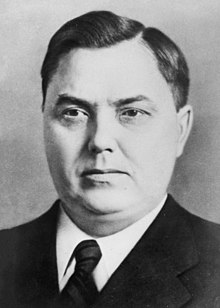
Back Georgi Malenkof Afrikaans جورجي مالينكوف Arabic جورجى مالينكوف ARZ Gueorgui Malenkov AST Georgi Malenkov Azerbaijani Маленков Георгий Максимилианович Bashkir Георгій Максімілянавіч Малянкоў Byelorussian Георгі Малянкоў BE-X-OLD Георгий Маленков Bulgarian গেওর্গি মালেনকোভ Bengali/Bangla
Georgy Malenkov | |||||||||||||||||||||
|---|---|---|---|---|---|---|---|---|---|---|---|---|---|---|---|---|---|---|---|---|---|
Георгий Маленков | |||||||||||||||||||||
 Official portrait, 1953 | |||||||||||||||||||||
| 5th Premier of the Soviet Union | |||||||||||||||||||||
| In office 6 March 1953 – 8 February 1955 | |||||||||||||||||||||
| President | |||||||||||||||||||||
| First Deputies | |||||||||||||||||||||
| Preceded by | Joseph Stalin | ||||||||||||||||||||
| Succeeded by | Nikolai Bulganin | ||||||||||||||||||||
| Deputy Premier of the Soviet Union | |||||||||||||||||||||
| In office 9 February 1955 – 29 June 1957 | |||||||||||||||||||||
| Premier | Nikolai Bulganin | ||||||||||||||||||||
| In office 2 August 1946 – 5 March 1953 | |||||||||||||||||||||
| Premier | Joseph Stalin | ||||||||||||||||||||
| In office 15 May 1944 – 15 March 1946 | |||||||||||||||||||||
| Premier | Joseph Stalin | ||||||||||||||||||||
| |||||||||||||||||||||
| Personal details | |||||||||||||||||||||
| Born | Georgy Maximilianovich Malenkov 8 January 1902 Orenburg, Russian Empire | ||||||||||||||||||||
| Died | 14 January 1988 (aged 86) Moscow, Russian SFSR, Soviet Union | ||||||||||||||||||||
| Resting place | Kuntsevo Cemetery, Moscow | ||||||||||||||||||||
| Citizenship | Soviet | ||||||||||||||||||||
| Political party | Communist Party of the Soviet Union (1920–1961) | ||||||||||||||||||||
| Domestic partner | Valeriya Golubtsova (1920–1987) | ||||||||||||||||||||
| Children | 3 | ||||||||||||||||||||
| Alma mater | Moscow Highest Technical School | ||||||||||||||||||||
| Profession |
| ||||||||||||||||||||
| Religion | Atheist convert to Russian Orthodox | ||||||||||||||||||||
Central institution membership
| |||||||||||||||||||||
Georgy Maximilianovich Malenkov[b] (8 January 1902 [O.S. 26 December 1901][1] – 14 January 1988)[2] was a Soviet politician who briefly succeeded Joseph Stalin as leader of the Soviet Union after his death in March 1953. After one week, Malenkov was forced to give up control of the party apparatus, but continued to serve as Premier of the Soviet Union. He then entered a power struggle with the party's First Secretary, Nikita Khrushchev that culminated in his removal from the premiership in 1955 as well as the Presidium in 1957.
Malenkov served in the Red Army during the Russian Civil War and joined the Communist Party in 1920. From 1925, he served in the staff of the party's Organizational Bureau (Orgburo), where he was entrusted with overseeing member records; this role led to his heavy involvement in facilitating Stalin's purges of the party in the 1930s. From 1939, Malenkov was a member of the party Secretariat, and during World War II was made a member of the State Defense Committee, where his primary responsibilities were aircraft and missile production. In 1946, he became a full member of the Politburo, where his rivals for succession to Stalin were Andrei Zhdanov and Lavrentiy Beria; Malenkov rose in stature after Zhdanov's death in 1948.
Following Stalin's death on 5 March 1953, Malenkov succeeded Stalin as Chairman of the Council of Ministers and the highest-ranking member of the Secretariat. On 14 March, the Politburo (then known as the Presidium) forced him to give up his position in the latter thereby allowing Nikita Khrushchev to become the party's highest-ranking Secretary. Subsequently, Malenkov contented himself serving as the Presidium's highest-ranking member and acting chairman until eventually being eclipsed by Khrushchev as the country's undisputed leader.[3] After being compelled to resign the premiership in 1955, Malenkov conspired with his colleagues in the Presidium to remove Khrushchev from the Soviet leadership. When the attempted coup by the so-called "Anti-Party Group" failed in 1957, Malenkov was dismissed from the Presidium before being expelled from the party altogether by 1961.
Cite error: There are <ref group=lower-alpha> tags or {{efn}} templates on this page, but the references will not show without a {{reflist|group=lower-alpha}} template or {{notelist}} template (see the help page).
- ^ "Georgi Malenkov Dies at 86; Stalin Successor (Published 1988)". The New York Times. 2 February 1988. Archived from the original on 19 August 2023. Retrieved 19 August 2023.
- ^ Frankel, Benjamin (6 March 1992). The Cold War, 1945–1991: Leaders and other important figures in the Soviet Union, Eastern Europe, China, and the Third World. Gale Research – via Internet Archive.
Georgy Malenkov 14 jan.
- ^ Brown, Archie (1996). The Rise and Fall of Communism. HarperCollins Publishers. pp. 232–233. ISBN 978-0-06-113882-9.